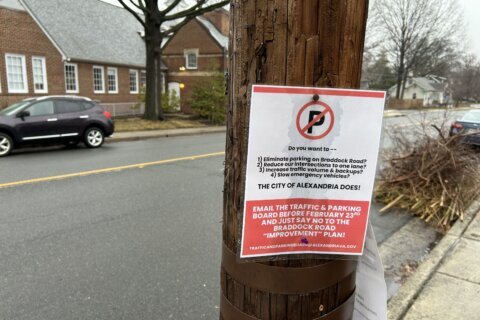More than 600 Virginia students are urging the state’s Department of Education to change guidelines they say would classify any references to LGBTQIA+ people and events as sexually explicit content.
In April, Gov. Glenn Youngkin signed SB 656, a bill that requires parents to be notified when school materials include sexually explicit content. It also requires school systems to offer a non-explicit option if parents ask for it.
In a letter, students from several Virginia school systems said the state should create guidelines regarding SB 656 “that clarify that the LGBTQIA+ community is not inherently sexual.”
Under Virginia law, homosexuality is explicitly defined as “sexual conduct.” And the law considers “sexually explicit content” to include “any picture, photograph, drawing, motion picture film, digital image or similar visual representation depicting sexual bestiality, a lewd exhibition of nudity, sexual excitement, sexual conduct or sadomasochistic abuse, coprophilia, urophilia, or fetishism.”
As part of the bill, the Virginia Department of Education was tasked with developing policies that notify parents when such materials are used. Each school system has until Jan. 1 to adopt measures in line with state policies.
Rivka Vizcardo-Lichter, lead organizer of The Pride Liberation Project, a coalition of more than 600 queer students and allies, said queer students want to see representation in class, and she fears materials from authors such as Virginia Woolf may be deemed sexually explicit and left out of lessons.
“It’s sexually explicit content that you would teach about the Stonewall riots, and sexually explicit content that you would educate people about the HIV epidemic,” Vizcardo-Lichter said. “… History had queer people in it, and continues to have queer people in it.”
The bill requiring parent notification passed the Virginia House in a 52-46 vote, and passed the state Senate in a 20-18 vote.
Proponents say the bill works to expand parental oversight of school materials.
Wednesday is the final day for the public to share comments on the draft policy. In a separate comment on the policy, the ACLU of Virginia said the definition of “sexually explicit conduct” is too broad and that the policies will burden teachers when there’s already a teacher shortage.
“Denying our children access to diverse viewpoints and experiences will only undermine their potential,” the ACLU of Virginia wrote. “Ignorance leads to fear. Fear leads to prejudice, discrimination and violence.”
Vizcardo-Lichter said the VDOE’s legal and regulatory coordinator responded to the letter by saying staff will review and consider it with other public feedback.
“Every time that I think we’re advancing protections for queer students like me, we just continue to move backwards with bills like these, and the guidelines being drafted around it,” she said.
WTOP has contacted the department for comment.








